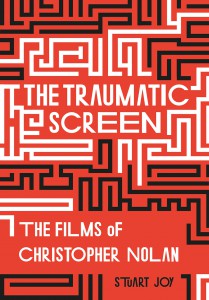On a related topic:
A Critical Companion to Christopher Nolan (2025)
Dir. Claire Parkinson and Isabelle Labrouillère
Subject: Director > Christopher Nolan
The Nolan Variations (2024)
The Movies, Mysteries, and Marvels of Christopher Nolan
by Tom Shone
Subject: Director > Christopher Nolan
The Political Christopher Nolan (2023)
Liberalism and the Anglo-American Vision
Subject: Director > Christopher Nolan
Christopher Nolan (2022)
The Iconic Filmmaker and His Work
by Ian Nathan
Subject: Director > Christopher Nolan
Unleashing Oppenheimer (2023)
Inside Christopher Nolan's Explosive Atomic-Age Thriller
by Jada Yuan
Subject: One Film > Oppenheimer
The Traumatic Screen
The Films of Christopher Nolan
by Stuart Joy


Average rating: ![]()
| 0 | rating | |
| 0 | rating | |
| 0 | rating | |
| 0 | rating |
Your rating: -
Book Presentation:
Christopher Nolan occupies a rare realm within the Hollywood mainstream, creating complex, original films that achieve both critical acclaim and commercial success. In The Traumatic Screen, Stuart Joy builds on contemporary applications of psychoanalytic film theory to consider the function and presentation of trauma across Nolan’s work, arguing that the complexity, thematic consistency, and fragmentary nature of his films mimic the structural operation of trauma.
From 1997’s Doodlebug to 2017’s Dunkirk, Nolan’s films highlight cinema’s ability to probe the nature of human consciousness while commenting on the relationship between spectator and screen. Joy examines Nolan’s treatment of trauma—both individual and collective—through the formal construction, mise-en-scène, and repeated themes of his films. The argument presented is based on close textual analysis and a methodological framework that incorporates the works of Sigmund Freud and Jacques Lacan. The first in-depth, overtly psychoanalytic understanding of trauma in the context of the director’s filmography, this book builds on and challenges existing scholarship in a bold new interpretation of the Nolan canon.
Press Reviews:
"Nolan's films have been explored in a number of critical works, but this is the first study to examine his work—from Doodlebug (1997) to Dunkirk (2017)—from a psychoanalytic perspective. The characters in Nolan’s films typically have undergone a traumatic experience and must reconcile past memories in order to move forward. [Joy's] synthesized approach to trauma . . . looks at themes of time, memory, identity, and narrative, motifs that are recurring elements in Nolan's films. For example, he takes a Freudian approach to exploring how the murder of the parents of the young Bruce Wayne (Batman) affected Wayne's development. A solid addition to the literature on Nolan. . . . Recommended."
CHOICE
"Stuart Joy’s The Traumatic Screen provides a careful and accurate analysis of the films of one of the most important contemporary directors: Christopher Nolan. Nolan’s films are not without criticism, and the final analysis might reveal that only a few of the (justly) lauded works of Christopher Nolan are truly worthy of the appellation 'great.' Nonetheless, the best of Christopher Nolan’s films are delightful intellectual puzzles that help provide a deeper understanding of human nature, and Stuart Joy’s The Traumatic Screen is a helpful guide to Nolan’s labyrinthian films."
Jesse Russell | Voegelinview
See the publisher website: Intellect Books
See the complete filmography of Christopher Nolan on the website: IMDB ...
> From the same author:
James Bond Will Return (2024)
Critical Perspectives on the 007 Film Franchise
Dir. Claire Hines, Terence McSweeney and Stuart Joy
Subject: One Film > James Bond
Contemporary American Science Fiction Film (2023)
Dir. Terence McSweeney and Stuart Joy
Subject: Genre > Science Fiction
The Cinema of Christopher Nolan (2015)
Imagining the Impossible
Dir. Jacqueline Furby and Stuart Joy
Subject: Director > Christopher Nolan